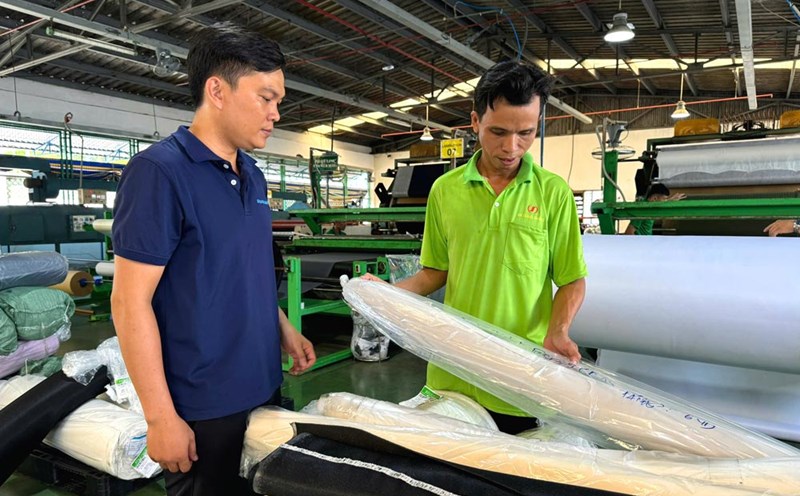Happiness index increased 11 places
Recently, at the National Assembly, Minister of Labor, War Invalids and Social Affairs (MOLISA) Dao Ngoc Dung reported the good news that Vietnam's happiness index increased by 11 levels and said that in recent times, social policies have been implemented correctly, sufficiently and promptly, creating important changes in awareness, action and effectiveness.
Among them, policies for people with meritorious services are mentioned as outstanding points, along with sustainable poverty reduction policies for disadvantaged groups based on the principle of ensuring minimum social security and gradually increasing social assistance levels.
Regarding the poverty reduction result of 1.93% achieved this year, Minister Dao Ngoc Dung affirmed that this is a great effort of the whole country in the context of consecutive natural disasters, floods and storms. "Vietnam is one of the countries that implements social policies well, especially compared to countries with similar economic conditions" - the minister shared.
According to the Government's report, in the first 9 months of the year, subsidies were paid to 1,080,582 people with revolutionary contributions, totaling more than 20,700 billion VND.
Currently, the country provides social assistance to nearly 3.8 million people (about 3.38% of the population); supports monthly care costs for 389,000 households and individuals who receive care and support for social protection beneficiaries. The total budget for social assistance payments is about 32,000 billion VND/year.
To date, the whole country has more than 2.7 million elderly people receiving monthly pensions and social insurance benefits; more than 1.4 million people receiving monthly social benefits, about 10,000 people being cared for at social assistance facilities; 95% of the elderly have health insurance cards, 32% have initial health monitoring records.
Also in the first 9 months of 2024, credit programs supported loans for over 1.8 million subjects, creating jobs for more than 533,000 workers. The labor market and employment continued to improve. In the first 9 months of the year, the unemployment rate was 2.26%, down 0.02 percentage points, and the underemployment rate among working-age people was 1.99%, down 0.03 percentage points...
Proposal to build a happiness index for Vietnamese people
According to National Assembly delegate Nguyen Thien Nhan (Ho Chi Minh City delegation), in terms of per capita income, Vietnam ranks 101/176 countries. Thus, compared to the per capita economic index of 101, Vietnam's happiness index ranks 54, reflecting this is a very commendable result.
This delegate said that Vietnam does not have a tool to quantify people's happiness; while the world has a set of indicators on happiness and assesses the happiness level of people in all countries. "Therefore, it is recommended that the Government should direct the development of a happiness index for Vietnamese people to self-determine, in accordance with Vietnamese culture, as a development indicator for localities" - said the delegate. At the same time, this delegate proposed that the minimum wage should be announced soon to ensure a full life, in accordance with the country's circumstances.
Meanwhile, on the issue of poverty reduction, National Assembly delegate Ma Thi Thuy (Tuyen Quang delegation) proposed that in policy design, the State should focus on supporting the poor, improving production capacity, paying attention to employment, creating conditions for poor households to proactively develop livelihoods in accordance with the conditions of each region's households and customs. In addition, it is necessary to maintain a number of preferential policies on loans, healthcare, and education for households that have escaped poverty for 1 to 3 years to create a more solid foundation...
Building Vietnam Happiness Index
Associate Professor, Dr. Bui Hoai Son - Standing Member of the National Assembly's Committee on Culture and Education - said that to build a set of national happiness indexes, it is necessary to consider a number of important steps.
First, there is a need to define clear and comprehensive indicators of well-being that capture multiple dimensions of well-being. These indicators could include economic factors, health, education, environmental quality, social support, and life satisfaction.
Next, it is necessary to establish a solid system to collect data from various sources, including surveys, government statistics and community feedback.
In addition, there is a need for the collaboration of multiple stakeholders in the development process, including government agencies, NGOs, academia and community representatives. At the same time, there is a need to raise awareness and educate about the importance of measuring happiness and well-being in the community. Finally, there is a need to ensure that findings from the happiness index will influence government policies and initiatives. Integrating happiness indicators into planning and decision-making will help Vietnam address the needs and desires of its people more effectively.












